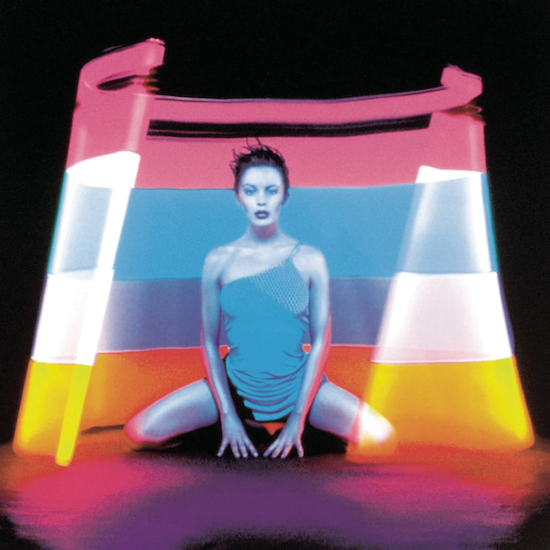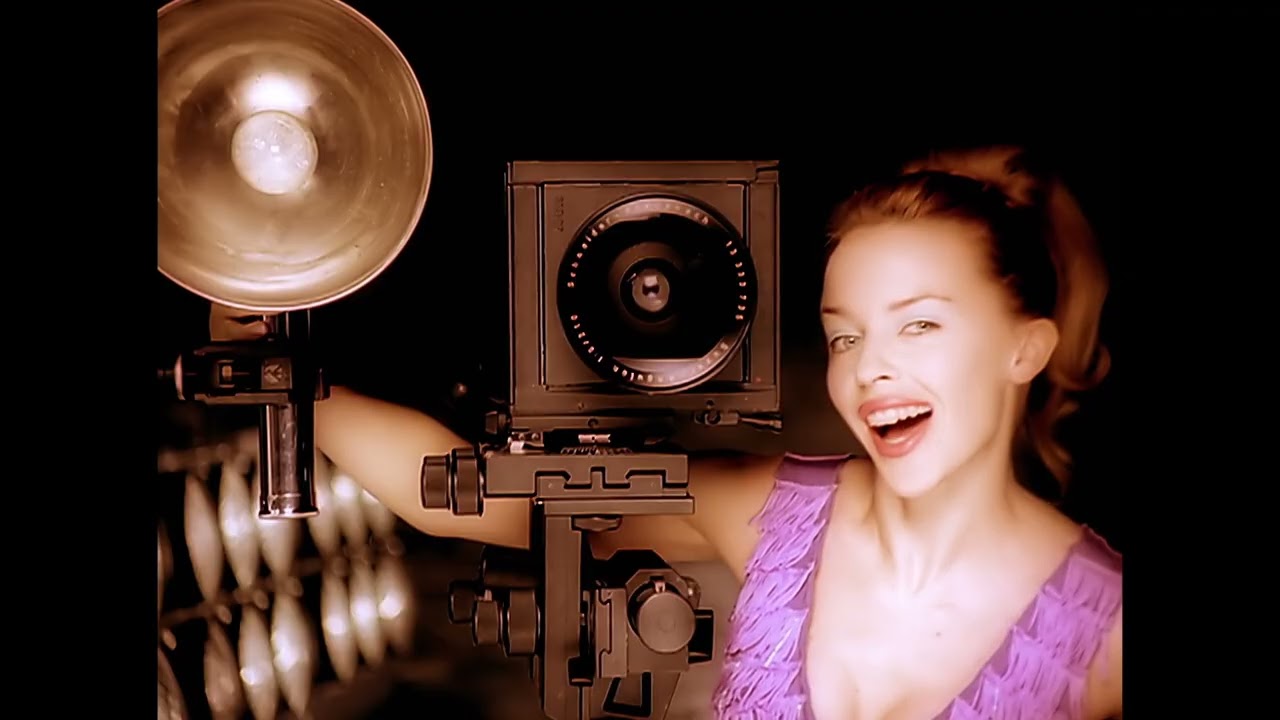When Kylie Minogue delivered an ecstatic, career-spanning set at Glastonbury in 2019, she performed precisely zero songs from her 1997 album Impossible Princess. This was hardly a shock to longtime fans, or the 3.2 million BBC viewers who watched her shimmy through indelible pop classics including ‘I Should Be So Lucky’, ‘Spinning Around’, ‘Love at First Sight’ and ‘Can’t Get You Out of My Head’. Minogue is a consummate professional who understands what people want from Glastonbury’s Sunday afternoon ‘legend’s slot’: hits, hits, and nothing but hits.
Impossible Princess doesn’t contain hits – not really big ones, anyway – but it’s a lot more interesting than the "flop" or creative curio it’s often painted as. The album, which is now being reissued on something called "Limited Edition Marble Vinyl" to mark its 25th anniversary, is the most personal, spiky and surprising chapter of the singer’s deceptively effortless career. It’s got Kylie doing trance, Kylie doing trip-hop, Kylie doing Britpop – yes, really. It’s also the first (and presumably) last time that this seasoned joy merchant sang about wanting "to know the limit of torture and tenderness".
Like so many albums that underperform commercially, Impossible Princess suffered from a bumpy rollout. It eventually came out in the UK in March 1998 – a full five months after the Japanese release – because Minogue’s British label Deconstruction kept getting cold feet. Bigwigs were so concerned that its title could seem insensitive in the wake of Princess Diana’s death in August 1997 that the album was rather lamely renamed Kylie Minogue in Europe. This meant, more than a little confusingly, that it had exactly the same title as Minogue’s previous Deconstruction album, which had become a gold-selling hit in 1994.
This sense of caution bordering on trepidation hardly suited the boldest album – both musically and lyrically – of Minogue’s career. Featuring songs co-written with Manic Street Preachers, Soft Cell’s Dave Ball and genre-melding Australian composer Rob Dougan, most of Impossible Princess doesn’t sound like "classic Kylie". Her previous album had put some distance between the singer and Stock Aitken Waterman’s slightly-past-its-prime pop production line by embracing more sophisticated house, R&B and adult contemporary sounds. It’s standout single, ‘Confide in Me’, had a pronounced Middle Eastern influence and an absolutely killer vocal from a revitalised singer. But compared to Impossible Princess, Kylie Minogue was a relatively measured evolution, not a fearless step forward.
Impossible Princess may have been a bold reinvention, but it wasn’t a reckless one. The album’s third single ‘Breathe’ is a mid tempo electro gem that wouldn’t sound out of place on any "best of Kylie" playlist. It also wouldn’t sound out of place on Madonna’s era-defining 1998 album Ray Of Light, which suggests Minogue had her finger squarely on the pulse. That said, Impossible Princess definitely found the singer, by now in her late twenties, pushing purposefully into new sonic territory. The album begins with the thundering drum & bass of ‘Too Far’. When Minogue sings "too many, too much, too hard / help me, this time I went too far", she could almost be anticipating the reaction of fans who were hoping instead for perky pop tunes in the vein of ‘Hand on My Heart’ and ‘The Locomotion’.
Minogue then channels Sinead O’Connor on the Celtic-inflected ‘Cowboy Style’ and leans into then-dominant Britpop on ‘Some Kind Of Bliss’, which she co-wrote with the Manics’ James Dean Bradfield and Sean Moore. Even 25 years down the line, the song is a tough nut for fans to crack. Released as the album’s lead single, it stalled at number 22 in the UK – her worst-ever chart position at the time – and number 27 in Australia. Her A&R Pete Hadfield later apologised for botching its promotion, but it probably didn’t help that ‘Some Kind Of Bliss’ came out the same week as Elton John’s ‘Candle in the Wind 1997’, which dominated the airwaves and is still the biggest-selling single in UK history.
Still, the main problem with ‘Some Kind Of Bliss’ is the fact it doesn’t really sound like a Kylie single. This doesn’t mean it’s a bad song – far from it. Actually, her voice sounds tremendous gliding over the lush string sections and Bradfield’s propulsive guitar lines. The lyrics, pieced together from two separate songs Minogue had sent to the Manics, are vague but evocative. "Shut my eyes, feel the colour of you," she sings on the first verse. "So get to this elation, so high, so fast." If it feels like an outlier in her singles discography, it’s not an unwelcome one – like a good mate who just doesn’t gel with the rest of your friendship group.
The album’s second single ‘Did It Again’ fared better, sneaking into the Top 15 in Australia and the UK. A slinky pop-rock tune, it was helped by a cleverly self-referential video featuring multiple Minogues: we see an iteration of the singer called ‘Cute Kylie’ interacting with ‘Sex Kylie’, ‘Dance Kylie’ and ‘Indie Kylie’. At the time, Minogue told MTV that the video was essentially her way of "having a laugh" at the media’s fondness for pigeonholing every change of image. "You know, with every different release of a single they’d say ‘What Kylie is it now?’ and it was just becoming a joke," she recalled. It belies the fact that the song’s lyrics also explore Minogue’s adaptability as an artist in a darker way. "Clever girl, you’ve got it all but you’re all messed up," she sings. "Time now, turn around / Move onto something else." It’s an intriguing snapshot of how she perceived herself in this era.
The album is filled with lyrics that seem to offer a glimpse of "the real Kylie". ‘I Don’t Need Anyone’, another Britpoppy co-write with the Manics, is surely an assertion of independence. The dark trance banger ‘Drunk’, one of Minogue’s noisiest songs, explores an all-consuming romantic relationship that can’t fulfil all her needs. "I’m suffocated with desire / I need to save me from myself," she sings. There’s a similar intensity to ‘Limbo’, a clattering club banger that recalls 90s dance punks Republica. "Caught in the crossfire, nobody gets it / I’m finding it hard to contain myself," Minogue sings, frustrated and ready to burst.
There are also more contemplative moments such as ‘Say Hey’, a pulsing electronic ballad that’s full of longing, and the gorgeous orchestral track ‘Dreams’. The latter finds Minogue grappling with the paradox of being an "impossible princess" as a woman and as a performer. For her, it involves "living in chaos and harmony" and being "hailed as a hero" but also "branded a fool". Once again, her appetite for artistic experimentation comes to the fore as she sings about wanting "to taste every moment and try everything". Like so much of Impossible Princess, ‘Dreams’ is heady, poetic and elegant in a leftfield kind of way. Sequenced as the album’s 12th and final track, it’s a fitting end to a fascinating journey.
Twenty-five years after it first came out, Impossible Princess remains a favourite of a certain type of Minogue disciple. "I think what resonates for that album’s fans is that you could see a little bit of my thought pattern in the lyrics that came from me," Minogue acknowledged
in 2010. Though she has never stood still as an artist – you could call 2018’s Golden album ‘Country Kylie’ and 2020’s Disco, well, ‘Disco Kylie’ – Impossible Princess is her most brazenly inventive work. “I always say that, regardless of how people see this [album], whether a success or a failure, it was necessary that she did this to scratch that itch, and then come back to pop," Minogue’s longtime musical collaborator Steve Anderson said earlier this year. “Without one thing, I’m not necessarily sure if the other thing would have happened quite as organically."
Wth the benefit of hindsight, the album’s most telling moment was the sultry trip-hop track ‘Jump’, with its simple but effective refrain, "I run to the future and jump". Within two years of wrapping the Impossible Princess campaign, she returned with a sparkling dance-pop song called ‘Spinning Around’ that was inevitably framed in the mainstream media as a comeback single. It entered the UK charts at Number One, and she never looked back.
The 25th anniversary vinyl edition of Impossible Princess is out now



